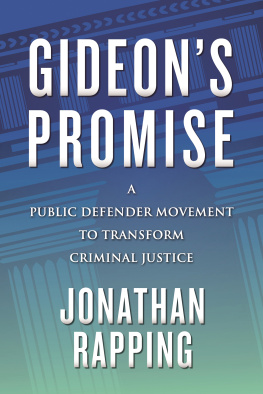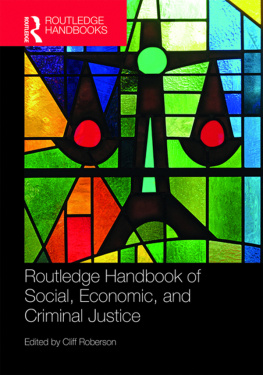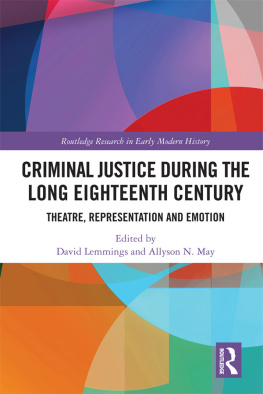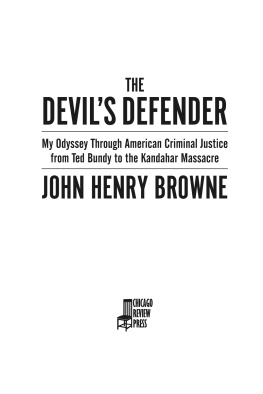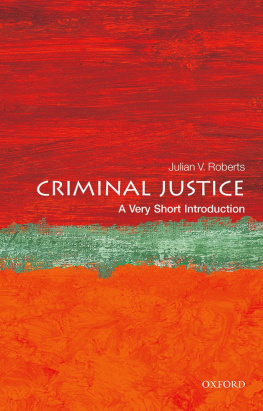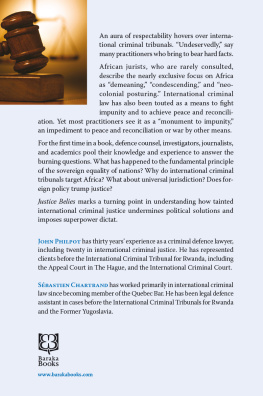Jonathan Rapping - Gideons Promise: A Public Defender Movement to Transform Criminal Justice
Here you can read online Jonathan Rapping - Gideons Promise: A Public Defender Movement to Transform Criminal Justice full text of the book (entire story) in english for free. Download pdf and epub, get meaning, cover and reviews about this ebook. year: 2020, publisher: Beacon Press, genre: Politics. Description of the work, (preface) as well as reviews are available. Best literature library LitArk.com created for fans of good reading and offers a wide selection of genres:
Romance novel
Science fiction
Adventure
Detective
Science
History
Home and family
Prose
Art
Politics
Computer
Non-fiction
Religion
Business
Children
Humor
Choose a favorite category and find really read worthwhile books. Enjoy immersion in the world of imagination, feel the emotions of the characters or learn something new for yourself, make an fascinating discovery.
- Book:Gideons Promise: A Public Defender Movement to Transform Criminal Justice
- Author:
- Publisher:Beacon Press
- Genre:
- Year:2020
- Rating:3 / 5
- Favourites:Add to favourites
- Your mark:
- 60
- 1
- 2
- 3
- 4
- 5
Gideons Promise: A Public Defender Movement to Transform Criminal Justice: summary, description and annotation
We offer to read an annotation, description, summary or preface (depends on what the author of the book "Gideons Promise: A Public Defender Movement to Transform Criminal Justice" wrote himself). If you haven't found the necessary information about the book — write in the comments, we will try to find it.
Jonathan Rapping: author's other books
Who wrote Gideons Promise: A Public Defender Movement to Transform Criminal Justice? Find out the surname, the name of the author of the book and a list of all author's works by series.
Gideons Promise: A Public Defender Movement to Transform Criminal Justice — read online for free the complete book (whole text) full work
Below is the text of the book, divided by pages. System saving the place of the last page read, allows you to conveniently read the book "Gideons Promise: A Public Defender Movement to Transform Criminal Justice" online for free, without having to search again every time where you left off. Put a bookmark, and you can go to the page where you finished reading at any time.
Font size:
Interval:
Bookmark:


This book is a collection of experiences that have clarified for me what drives our modern approach to criminal justice and helped me to see a path forward. There are conversations I recount for which I cannot recall the wording verbatim. But I have tried to be as accurate in my recollection as possible. Discussions are in quotation marks to illustrate dialogue between participants. Any quotes that are precise are cited. Those that are not cited are based on my memory. In all cases, the spirit and messaging of every conversation presented here is true.
To my parents, Leonard and Elayne, for giving me guidance.
To my life partner, Ilham, for giving me support.
And mostly to my children, Aaliyah and Lucas, for giving me boundless hope for the future.
[The assistance of counsel] is one of the safeguards of the Sixth Amendment deemed necessary to insure fundamental human rights of life and liberty.... The Sixth Amendment stands as a constant admonition that, if the constitutional safeguards it provides be lost, justice will not still be done.
Gideon v. Wainwright, 372 U.S. 335 (1963),
citing Johnson v. Zerbst, 304 U.S. 458, 304 U.S. 462 (1938)
I DECIDED I WANTED TO BE A LAWYER the first time I walked into a courtroom. I could not have been more than six years old. My parents were activists in Pittsburgh, Pennsylvania. As Jews, they both embraced the concept of Tikkun Olam: that we all have a duty to help repair the world. My sister and I were taught that we had an obligation to stand up to oppression. We would frequently accompany our parents to various demonstrations.
On this occasion, several friends had been arrested protesting the Vietnam War. I went to court with my mother to show support. Even at this young age, I had been taught to have a healthy dose of skepticism of authority. True to these teachings, I went to court with my toy water gun tucked in my pants.
I remember the courtroom being packed with protestors, and a heavy police presence lining the walls. The audience was vocal in its support of the accused, and the police appeared ready for confrontation. Amid the chaos, our friends stood at counsel table. Their lawyers were by their sides. To me, these defenders were like superheroes, ready to protect our friends from whatever the law enforcement machine was trying to do to them. I wanted to run up to the defense table and stand with the lawyers. It seemed safer up there.
All of a sudden, the lights in the courtroom went out. I heard yelling. I felt myself get bumped. I held my mothers hand tightly and waited for the lights to come back on. When they did, some of our friends in the audience had been roughed up. A few were being arrested. I looked over and saw the sleeve of my mothers coat was ripped. At that moment, I understood courtrooms as places where it was possible for injustice to happen. I knew that I wanted to be on the side of those arrested. I decided then that I wanted to defend people.
At about the same time I first stepped into a courtroom, a man named Donald Brown was robbing people in Buffalo, New York. Until that point, he had spent his adulthood surviving outside the law. But he was on the cusp of making a transition in life. Within a few years, Brown would convert to Islam, take the name Shakir Askia, invest in a fish market, marry an intelligent and hardworking girl from downtown Buffalo, and begin to raise a family. IlhamIlly, as I would come to call herwould be their first child together. By the time Illy was five years old she would have two younger sisters and her mother would be pregnant with her baby brother. But to Illy, she may as well have been her fathers only child. He was Illys world, and she felt like nothing in life competed for his attention. He assured her that she was beautiful, smart, and capable. He was her everything.
And then her world shattered. Shakir was arrested for crimes he had committed years earlier. He was given a public defender who did not seem to care. The defender did not fight for Illys father. He never offered a counternarrative to the picture of Donald Brown painted by the state. Without a voice committed to telling Shakirs story, he was convicted and sent to Attica state prison for ten years.
In the early years, Illy maintained a relationship through visits to the prison. But over time, the strain of trying to stay connected to Shakir, who became increasingly institutionalized, took its toll. He began to fade from her life.
As Illy grew up in Buffalo, she would watch almost every man in her family get caught up in the criminal justice system. She helped raise her baby brother, even bringing him to live with her when she attended Cornell University. But without any male role models in his life who were not involved with the system, he too spent time incarcerated.
As difficult as it was being separated from the men Illy loved, the greatest toll the experience took was leaving her with the understanding that the lives of the people in her black community have less value than the lives of other people in our society. She learned at the tender age of five that some lives do not matter.
Illy and I both had our first experiences with the criminal legal system very early in life. We both learned that the system is not fair. We each had very different reactions to that experience. I saw lawyers as valiant defenders of justice in an unjust world. That experience shaped my ultimate career path. I would go on to become a public defender, an advocate devoted to fighting for the most marginalized members of society in our nations criminal courtrooms.
Illys experience taught her that the system was hostile to the people she loved. It viewed her community as subhuman. It destroyed families and left children scarred, without a shred of empathy for the people harmed along the way. In her experience, the lawyer was not a hero at all. He was the medium through which her family came to understand that their lives did not matter. It was through the public defender that the callousness and indifference of the criminal justice system was so clearly conveyed.
Unlike me, Illy decided she wanted nothing to do with the criminal justice system. She decided to become a schoolteacher. She would dedicate her life to helping children like herself escape the cradle-to-prison pipeline that claimed so many people she knew and loved.
Illy and I met in Washington, DC, where she began her career as a first-grade teacher in a community similar to the one that raised herlow-income, predominantly African American, presumed dangerous. She understood it was a neighborhood filled with wonderful people, with incredible potential and little opportunity. I was a few years into my career as a public defender in the same city. My work frequently brought me to the neighborhood where she taught. I learned that to be effective, public defenders had to be committed to learning and telling the stories of impacted people. They had to listen to those they served. They truly had to value their voices.
Illy and I would soon fall in love and eventually marry. As our relationship blossomed, she got to know the many passionate public defenders I worked with. They were a very different type of public defender than those shed experienced growing up in Buffalo. She saw that public defenders could be incredibly important allies to the communities she cared about. She began to believe that a public defender office that truly respected the people it served could be a powerful vehicle against the demands of a callous system.
Font size:
Interval:
Bookmark:
Similar books «Gideons Promise: A Public Defender Movement to Transform Criminal Justice»
Look at similar books to Gideons Promise: A Public Defender Movement to Transform Criminal Justice. We have selected literature similar in name and meaning in the hope of providing readers with more options to find new, interesting, not yet read works.
Discussion, reviews of the book Gideons Promise: A Public Defender Movement to Transform Criminal Justice and just readers' own opinions. Leave your comments, write what you think about the work, its meaning or the main characters. Specify what exactly you liked and what you didn't like, and why you think so.

